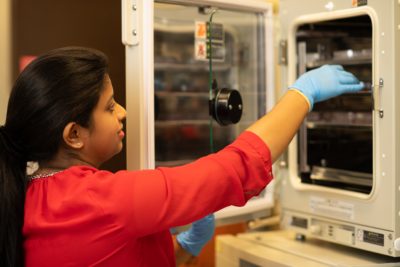The Effectiveness of Therapeutic Drugs for AMD in the Laboratory
Ruvanthi Kularatne, Ph.D., is a Postdoctoral Fellow at the Retina Foundation of the Southwest, working under the direction of Karl Csaky, M.D., Ph.D., Managing & Medical Director. Dr. Kularatne has spent the past year evaluating the effectiveness of therapeutic drugs, and their impact on treatment for age-related macular degeneration (AMD). Currently, our researchers are working on finding drugs that protect the retinal pigment epithelium (RPE), cells located in the retina under the photoreceptors. The retinal pigment epithelium act as support cells to the photoreceptors, providing an energy source and clearing waste from these vital cells. Discovering drugs capable of protecting the RPE is the first step in finding a treatment to slow down the progression of AMD.
Therapeutic drugs are being developed by Chandima Bulumulla, Ph. D., a chemist in Dr. Csaky’s lab. These drugs are then given to Dr. Kularatne for a full evaluation. Dr. Kularatne evaluates the overall health of the cells using the EVOS-XL microscope. The cells are divided into two groups, one treated and the other un-treated. Both groups are placed in an incubator for several hours, possibly days, dependent upon the experiment. The incubator provides ideal growth conditions for the live cells with a sterile, temperature-controlled environment.
Once the incubation period is complete, Dr. Kularatne conducts assays that determine the drugs’ effect on the overall health and biological activity of the treated cells. These assays allow our researchers to compare and contrast the effectiveness of each drug. Each of Dr. Kularatne’s experiments are done in triplicate measurements to verify and re-verify the results.
When a specific drug formula seems promising, multiple variables of that same therapeutic drug are tested. This is done to determine the drug’s effectiveness over different periods of time, and to also evaluate different concentrations of the drug. Dr. Kularatne will submit her research findings to peer reviewed journals for potential publication. Dr. Csaky will also share these findings with the AMD research community through publications and presentations. The goal is to advance the treatment of AMD by providing new treatment options.

Related Articles
Engaging iPad Game Approach as Alternative to Patching Recently@Retina Newsletter May 2023 Recently@Retina Newsletter August 2024 Retina foundation showcases breakthroughs for treatment of age-related macular degeneration during eye on innovation conversation series Retina Foundation Completes $3.7M Capital Campaign